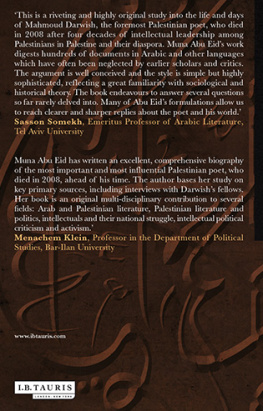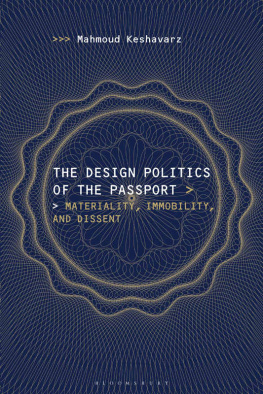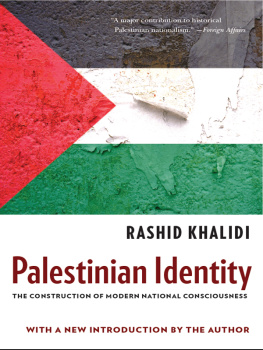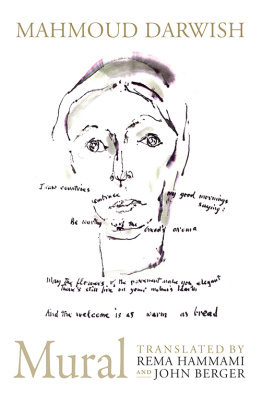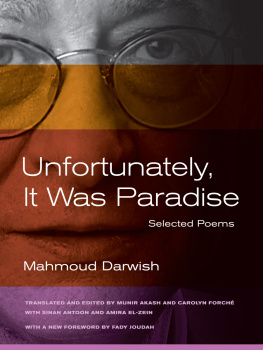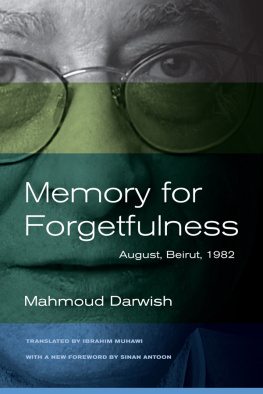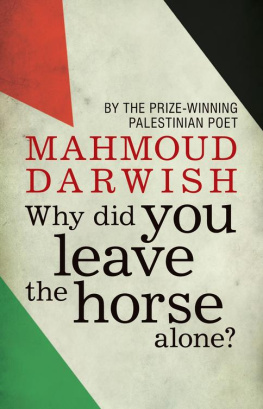Muna Abu Eid - Mahmoud Darwish : Literature and the Politics of Palestinian Identity
Here you can read online Muna Abu Eid - Mahmoud Darwish : Literature and the Politics of Palestinian Identity full text of the book (entire story) in english for free. Download pdf and epub, get meaning, cover and reviews about this ebook. year: 2016, publisher: Bloomsbury UK, genre: Politics. Description of the work, (preface) as well as reviews are available. Best literature library LitArk.com created for fans of good reading and offers a wide selection of genres:
Romance novel
Science fiction
Adventure
Detective
Science
History
Home and family
Prose
Art
Politics
Computer
Non-fiction
Religion
Business
Children
Humor
Choose a favorite category and find really read worthwhile books. Enjoy immersion in the world of imagination, feel the emotions of the characters or learn something new for yourself, make an fascinating discovery.
- Book:Mahmoud Darwish : Literature and the Politics of Palestinian Identity
- Author:
- Publisher:Bloomsbury UK
- Genre:
- Year:2016
- Rating:4 / 5
- Favourites:Add to favourites
- Your mark:
- 80
- 1
- 2
- 3
- 4
- 5
Mahmoud Darwish : Literature and the Politics of Palestinian Identity: summary, description and annotation
We offer to read an annotation, description, summary or preface (depends on what the author of the book "Mahmoud Darwish : Literature and the Politics of Palestinian Identity" wrote himself). If you haven't found the necessary information about the book — write in the comments, we will try to find it.
Muna Abu Eid: author's other books
Who wrote Mahmoud Darwish : Literature and the Politics of Palestinian Identity? Find out the surname, the name of the author of the book and a list of all author's works by series.
Mahmoud Darwish : Literature and the Politics of Palestinian Identity — read online for free the complete book (whole text) full work
Below is the text of the book, divided by pages. System saving the place of the last page read, allows you to conveniently read the book "Mahmoud Darwish : Literature and the Politics of Palestinian Identity" online for free, without having to search again every time where you left off. Put a bookmark, and you can go to the page where you finished reading at any time.
Font size:
Interval:
Bookmark:

Muna Abu Eid is a Palestinian academic researcher specializing in Arabic literature, history, and political science. She has published numerous articles in newspapers, popular magazines and scholarly journals and her areas of interest include intellectuals, Palestine and the Palestinian question, nationalism, culture and resistance, national poets and issues of nation-building. She holds a PhD from Bar-Ilan University.
This is a riveting and highly original study into the life and days of Mahmoud Darwish, the foremost Palestinian poet, who died in 2008 after four decades of intellectual leadership among Palestinians in Palestine and their diasporas. Muna Abu Eid's work digests hundreds of documents in Arabic and other languages which have often been neglected by earlier scholars and critics. The argument is well conceived and the style is simple but highly sophisticated, reflecting a great familiarity with sociological and historical theory. The book endeavours to answer several questions so far rarely delved into. Many of Abu Eid's formulations allow us to reach clearer and sharper replies about the poet and his world.
Sasson Somekh, Emeritus Professor of Arabic Literature, Tel Aviv University
Muna Abu Eid has written an excellent, comprehensive biography of the most important and most influential Palestinian poet, who died in 2008, ahead of his time. The author bases her study on key primary sources, including interviews with Darwish's fellows. Her book is an original multi-disciplinary contribution to several fields: Arab and Palestinian literature, Palestinian literature and politics, intellectuals and their national struggle, intellectual political criticism and activism.
Menachem Klein, Professor in the Department of Political Studies, Bar-Ilan University
MAHMOUD
DARWISH
Literature and the Politics of
Palestinian Identity
M UNA A BU E ID

Published in 2016 by
I.B.Tauris & Co. Ltd
London New York
www.ibtauris.com
Copyright 2016 Muna Abu Eid
First published in 2013 as Mahmoud Darwish: Poet of the Palestinian Iliad in Hebrew by the Moshe Dayan Center.
The right of Muna Abu Eid to be identified as the author of this work has been asserted by the author in accordance with the Copyright, Designs and Patents Act 1988.
All rights reserved. Except for brief quotations in a review, this book, or any part thereof, may not be reproduced, stored in or introduced into a retrieval system, or transmitted, in any form or by any means, electronic, mechanical, photocopying, recording or otherwise, without the prior written permission of the publisher.
References to websites were correct at the time of writing.
Written Culture and Identity 4
ISBN: 978 1 78453 071 6
eISBN: 978 1 78672 013 9
ePDF: 978 1 78673 013 8
A full CIP record for this book is available from the British Library
A full CIP record is available from the Library of Congress
Library of Congress Catalog Card Number: available
To the memory of the Nakba survivors,
my parents Yusuf and Najiya Abu Eid,
and my uncles Lutfi, Ahmad, and Adnan al-Nabulsi
CONTENTS
INTRODUCTION
Over the last two decades many studies have been published about Mahmoud Darwish. Most of these are literary studies, examining the style, themes, and motifs of his poetry. Since the end of the 1980s, many of Darwish's poems and books have been translated from Arabic and published in many languages, including Hebrew. Nevertheless, we have yet to see the publication of a comprehensive study about Darwish as an intellectual in Palestinian politics and society.
Many studies have been written about the Palestinian national movement in Arabic, in Hebrew, and in other languages. The majority of these engaged in the debate about the birth and origins of the Palestinian national movement.
Despite the fact that Darwish spent more than 30 years in the PLO, was closely associated with Yasir Arafat, and even drafted the Palestinian Declaration of Independence in 1988, none of the writers of these studies have thoroughly examined Darwish's activities and role in the Palestinian national movement.
Time and again, Darwish aroused public controversy in Israel and outside. One such controversy arose in 2000, during the period of Ehud Barak's government (19992001), when then-Minister of Education and Culture Yosi Sarid proposed introducing Darwish's poetry into the curricula of the Hebrew schools. Sarid noted at a press conference that Darwish's poetry should be included in the school curricula not only because he is Palestinian, but because of the literary quality of his work. These are lyrical, beautiful poems, with no nationalistic tones, he claimed. A different political and national line of reasoning was given by journalist Gidon Levy:
After great delay, school children in Israel who grew up for generations on a curriculum that is engaged in suppressing information and blatant bias, in which they were taught that Arabs are always the bad guys and we are always the only good guys will be able to discover that there is another side to this story. Perhaps through the Palestinian poetry of Mahmoud Darwish and Sihm D'd they will understand that this land was not empty before their parents parents came here, that the just establishment of their state did an awful injustice to the other inhabitants of this land, that this land's other sons, the Palestinians, love this land at least as much as they do, whether they live in exile like Darwish, or whether they are exiles in their own land, like Da'd. And they will discover, perhaps, for the first time in their lives that Palestinians is not a collective code name for a band of terrorists or an inferior people, but a nation like their nation, that gave rise to poetry that is no lesser than the poetry of their own people. These discoveries will only strengthen the generation that is exposed to them. After more than fifty years, and after having become a regional superpower, Israel should and must allow its young generation to know the true history of their land and the dreams and pains of the other inhabitants of it.
Sarid's proposal was criticized from the Right, and a vote of no confidence was raised in the Knesset, threatening to create a political crisis. Criticism came not only from the political Right but also from people in the Committee for Literature Instruction, which included academics and Education-Ministry professionals. The proposal to teach Darwish's works angered members of the committee, who saw it as interference in their political judgment. Chairperson of the Professional Committee for Literature Education, Prof. Ziva Shamir from the Department of Hebrew Literature at Tel Aviv University, said:
Sarid has tried to establish a precedent in the Ministry of Education: until now, no politician has dared try to decide what the content of school curricula should be. But now, the Minister of Education, who is also the chairman of the Council on Higher Education, does not hesitate to endanger academic freedom and to interfere in professional decisions in the teaching of literature.
The chairman of the Likkud faction in the Knesset, MK Re'uven Rivlin, characterized as scandalous Sarid's decision to cut poems by Alterman, Bialik, and from the legacy of Sephardic Jewry out of the curriculum, and in their place to insert poems by an anti-Zionist Israel-hating poet who calls for the destruction of the Zionist entity.
What is amazing in this whole story is that none of those involved in the dispute even raised the question of whether the Education Ministry had the resources to take on the challenge presented by this proposal. Did the Israeli-Jewish teachers have the tools needed in order to teach Darwish's poetry? Would such training be given through courses by the Israeli Ministry of Education or through academic courses in the departments of Arabic literature at the universities? Such a discussion did take place, far from the eyes of the media, between Dr Re'uven Snr, head of the Department of Arabic Literature at the Hebrew University, and Dr Shlomo Alon, the supervisor of Arabic instruction in the Education Ministry. Snir claimed that modern Arabic poetry is virtually not studied in the Israeli high schools:
Next pageFont size:
Interval:
Bookmark:
Similar books «Mahmoud Darwish : Literature and the Politics of Palestinian Identity»
Look at similar books to Mahmoud Darwish : Literature and the Politics of Palestinian Identity. We have selected literature similar in name and meaning in the hope of providing readers with more options to find new, interesting, not yet read works.
Discussion, reviews of the book Mahmoud Darwish : Literature and the Politics of Palestinian Identity and just readers' own opinions. Leave your comments, write what you think about the work, its meaning or the main characters. Specify what exactly you liked and what you didn't like, and why you think so.

